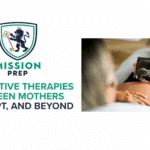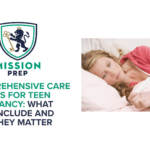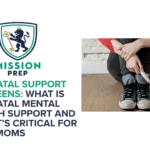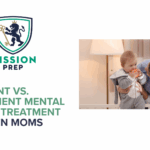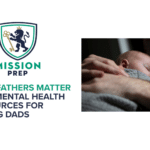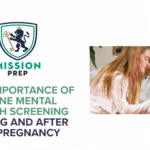OBGYN Referrals for Perinatal Mental Health Care

Finding out you’re pregnant as a teen can bring a rollercoaster of emotions: excitement, fear, confusion, and even loneliness. These feelings can be a lot to handle, especially if you feel like your grip on your mental health is slipping.
But the good news is that you don’t have to go through this experience alone – there are people who care about and can understand what you’re going through. And not just how you feel physically; we’re talking emotionally as well.
Support often begins with your OBGYN – the doctor who cares for you and your baby during pregnancy. Yet many people don’t realize that OBGYNs also play a big role in supporting your mental health. So, if you’re feeling overwhelmed, low, or anxious during your pregnancy, your OBGYN can connect you with the right mental health care.
This article can also make sure you know how your OBGYN can help and the right questions to ask, as it covers:
- How OBGYNs can support teen mental health
- Why early intervention matters
- How teen pregnancy and OBGYN support go together
- The importance of mental health and obstetrics coordination
- What OBGYN mental health referrals are
- Ways to find support

How OBGYNs Help Teen Mental Health
As OBGYNs are usually the first medical professional a pregnant person sees, they’re very well placed to help you with both your physical and emotional well-being during pregnancy. Therefore, if you’re feeling sad, worried, angry, or just not like your normal self, you can share this with your OBGYN. You certainly won’t be the first person to talk to them about such feelings, and they’ll know the right steps to take to support you.
For example, a mental health screening by OBGYN is often the first step to understanding whether something is going on underneath the surface. During this screening, you’ll be asked questions to help figure out if you have a perinatal mental health condition, and if so, which one.
If your OBGYN thinks you could benefit from extra support for your mental health, there are certain things they can do. OBGYN mental health referrals are one of these actions. These referrals include arranging access to other services, such as therapy.
Perinatal mental health referrals for teens can be a real turning point if you are struggling with your well-being. As soon as you feel like something is “off,” don’t hesitate to talk to your OBGYN. Getting help early on is the key to feeling better.
Importance of Early Referrals for Pregnant Teen Therapy
Plus, you may not realize that your mental health can also affect your child. Studies show that if you have an untreated mental health problem while pregnant, there are increased risks of complications. These complications include the possibility of giving birth prematurely or having a miscarriage, or your baby having a low birth weight or even brain development issues.5,6 Also, if you are depressed or very anxious after giving birth, you may have some difficulties bonding with your new baby because of the challenges these mental health issues bring.7
All this information isn’t meant to scare you. It’s just to highlight the importance of seeking timely support. Fortunately, OBGYN mental health referrals make accessing the help you need much easier. They can put you in touch with the right mental health professionals so that you can get treatments that work for turning your well-being around.
Additionally, OBGYNs can give you access to immediate resources for improving your mental health, like self-help or support groups. In light of all that an OBGYN can help you with, it’s clear that perinatal support referrals for adolescents mean that getting the help you need is only a conversation away.
What Is an OBGYN and Mental Health Partnership?
An integrated care with OBGYN and therapist plan sometimes means that all your treatment needs can be taken care of under the one roof. However, more commonly, it means that your OBGYN will coordinate your care with your mental health provider to make sure you are getting the help you need promptly. This way, everyone is on the same page and knows what is happening, how you are being supported, and what extra resources could be useful. Research even shows that a collaborative or integrated care model improves your treatment outcomes, highlighting its importance.8,9
At Mission Prep, we hold integrated care at the heart of what we do. From the moment your OBGYN mental health referrals reach us, you can rest assured that your care will be coordinated between your healthcare professionals, while still protecting your confidentiality.
Why Youth-Friendly OBGYN Care Matters
When you get the right care, everything can change for the better. You need to feel comfortable with the person treating you, especially when it comes to something as special and intimate as pregnancy and your mental health. Youth-friendly services provide a safe and comfortable environment for teens to get the treatment and support they need. This means that your healthcare provider will take into account your age and unique physical and emotional needs when it comes to providing you with information and care.
To put it simply, trusting your OBGYN is of utmost importance during your pregnancy. They’re the ones who set up your teen maternal health referral process, so you need to feel comfortable enough to tell them about any concerns you have. Knowing that you’re not being judged can be the difference between hiding your feelings and opening up and getting the help that you (and your baby) need and deserve.
OBGYN Resources for Teen Moms
Being able to access the right OBGYN care and resources is essential for a healthy pregnancy. If you need help finding resources, the following are some tips for setting you on the right path:
- Find the right OBGYN for your needs: Talk to your primary doctor, family members, or trusted friends for recommendations of teen-friendly OBGYNs. You could also check out websites like the American College of Obstetricians and Gynecologists (ACOG) to find OBGYNs in your local area.
- Seek out support groups: Peer support groups are a great source of emotional comfort. You could speak to your school counselor to find out if they know of any resources, or check out our page “Peer Support Groups for Pregnant Teens.”
- Do some research about the services available to you: The Department of Health and Human Services offers resources for pregnant and parenting teens.
- Research mental health treatment options: If you’re interested in the best therapies for teen mothers and pregnant teens, read our guide “Effective Therapies for Teen Mothers.” At Mission Prep, we specialize in teen mental health treatment, including perinatal mental health, and offer both in-person and online access to services.
- Reach out to a hotline: If you need someone to talk to about what you’re going through, there are hotlines you can call 24/7 that provide free and confidential support. For instance, you could call the 988 Suicide & Crisis Line if you are in distress, or the National Maternal Mental Health Hotline on 1-833-852-6262 (1-833-TLC-MAMA).

Mission Prep: Finding Support for Pregnant Teen Mental Health
Pregnancy, especially during the teenage years, can come with a variety of challenges. But you don’t have to cope with everything on your own. This is especially true when it comes to your mental health. If you feel overwhelmed, sad, worried, or just not sure what to do next, don’t ignore those feelings. It helps to talk to someone and get support. With the right care and coordination – between your OBGYN and mental health provider – you can feel stronger and more supported throughout your pregnancy.
At Mission Prep, we specialize in perinatal mental health treatment for teens. If you are struggling to navigate pregnancy and mental health, reach out to us. We can build a completely personalized care plan that puts you first. Plus, you don’t even need to wait for OBGYN mental health referrals to talk to us. You can access our services anytime, anywhere. It might also help to check out some of our free resources, including:
If you’re feeling lost, reach out to us today to get the support you and your baby need and deserve.
References
- Hodgkinson, S., Beers, L., Southammakosane, C., & Lewin, A. (2013). Addressing the mental health needs of pregnant and parenting adolescents. PEDIATRICS, 133(1), 114–122. https://doi.org/10.1542/peds.2013-0927
- Policy Center for Maternal Mental Health. (2025, April 28). About maternal mental health disorders. https://policycentermmh.org/mmh-disorders/
- Peter, P. J., De Mola, C. L., De Matos, M. B., Coelho, F. M., Pinheiro, K. A., Da Silva, R. A., Castelli, R. D., Pinheiro, R. T., & Quevedo, L. A. (2016). Association between perceived social support and anxiety in pregnant adolescents. Brazilian Journal of Psychiatry, 39(1), 21–27. https://doi.org/10.1590/1516-4446-2015-1806
- Scholl, C. C., Trettim, J. P., Böhm, D. M., Molina, M. L., Soares, M. C., Da Costa Dias, N., De Paiva Soares Reyes, I., De Matos, M. B., De Miranda Justo, J. M. R., Pinheiro, R. T., & De Avila Quevedo, L. (2022). Are adolescents more likely to have antenatal anxiety disorders than adult women? A comparison between two samples. Journal of Affective Disorders, 316, 50–55. https://doi.org/10.1016/j.jad.2022.07.071
- Wu, Y., De Asis-Cruz, J., & Limperopoulos, C. (2024). Brain structural and functional outcomes in the offspring of women experiencing psychological distress during pregnancy. Molecular Psychiatry, 29(7), 2223–2240. https://doi.org/10.1038/s41380-024-02449-0
- Schofield, Z., & Kapoor, D. (2019). Pre-existing mental health disorders and pregnancy. Obstetrics Gynaecology & Reproductive Medicine, 29(3), 74–79. https://doi.org/10.1016/j.ogrm.2019.01.005
- O’Dea, G. A., Youssef, G. J., Hagg, L. J., Francis, L. M., Spry, E. A., Rossen, L., Smith, I., Teague, S. J., Mansour, K., Booth, A., Davies, S., Hutchinson, D., & Macdonald, J. A. (2023). Associations between maternal psychological distress and mother-infant bonding: a systematic review and meta-analysis. Archives of Womens Mental Health, 26(4), 441–452. https://doi.org/10.1007/s00737-023-01332-1
- Allen, E. C., Sakowicz, A., Parzyszek, C. L., McDonald, A., & Miller, E. S. (2022). The association between engagement in a perinatal collaborative care program and breastfeeding among people with identified mental health conditions. American Journal of Obstetrics & Gynecology MFM, 4(3), 100591. https://doi.org/10.1016/j.ajogmf.2022.100591
- Firrahmawati, L., Wasityastuti, W., Kandarina, B. J. I., Marti, E., Chandra, L. A., & Sulistianingsih, A. (2025). The efficacy of collaborative psychological interventions in reducing anxiety levels in pregnant women: a systematic review and meta-analysis. BMC Pregnancy and Childbirth, 25(1). https://doi.org/10.1186/s12884-025-07523-1
- Congressional Research Service. (2018, May 18). Social Security and Medicare trustees: Summary of the 2018 annual reports (CRS Report No. R45184). https://www.congress.gov/crs-products/report/R45184

